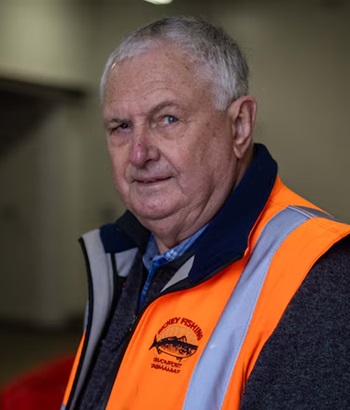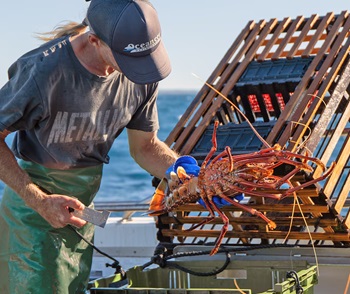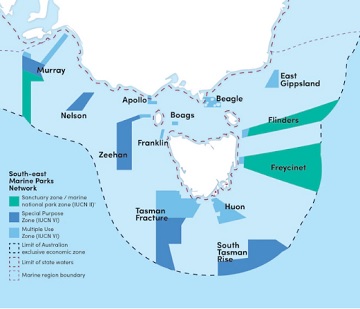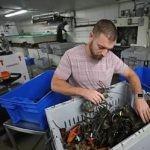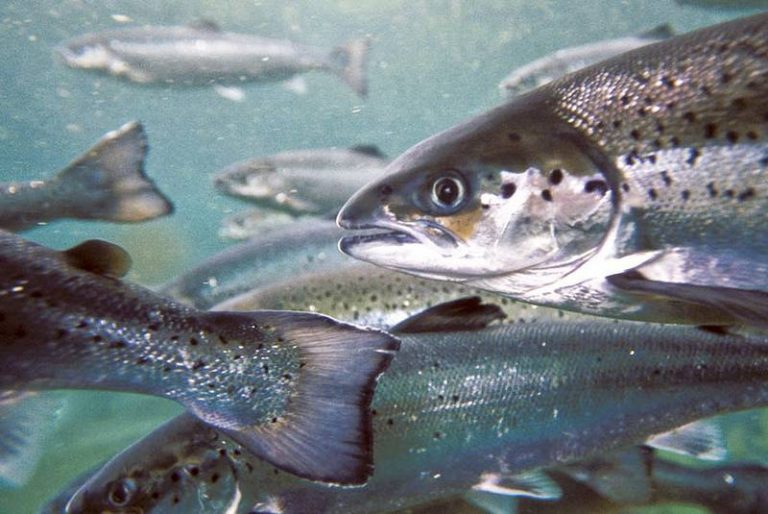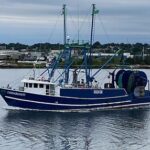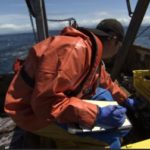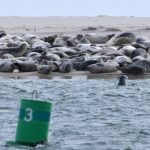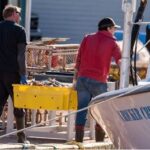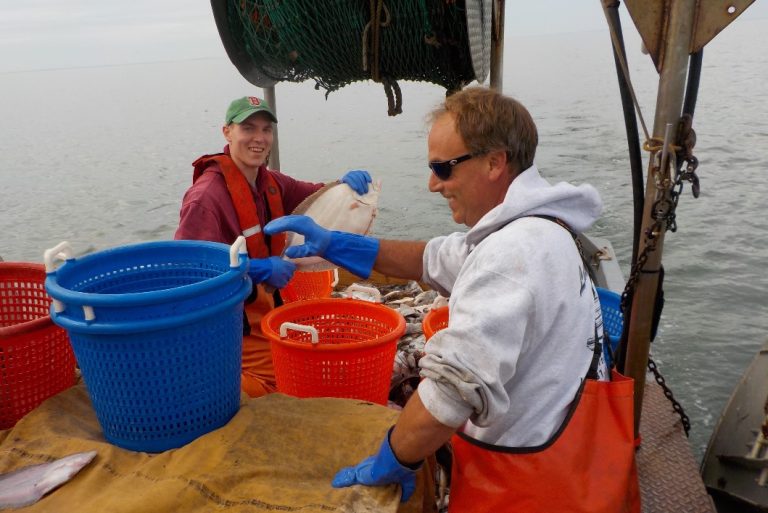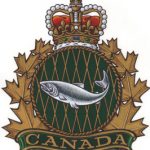Tag Archives: South Australia
Australian rock lobster will soon be exported to China again — here’s what it means for the industry and consumers
China’s ban on Australian rock lobsters is expected to be lifted by the end of the year, Prime Minister Anthony Albanese has announced. Rock lobster fishers say China is “by far” their biggest market and the impact on coastal WA communities will be significant. However, it could mean Australians will end up paying more for the prized delicacy once exports resume. Australian rock lobster fishers soon will be able to export their prized catches to China again, after four years out in the cold. The welcome development was announced yesterday following a meeting between Prime Minister Anthony Albanese and Chinese Premier Li Qiang on the sidelines of the ASEAN summit in Vietnam. Exports are expected to resume by the end of the year, in time for Chinese New Year in 2025. Here’s what it means for Australia. Photos, more, >>CLICK TO READ<< 19:15
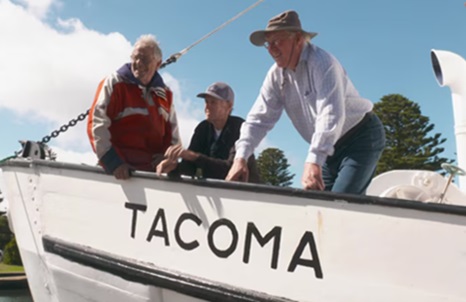
Port Fairy residents reminiscence origins of 1950s pioneering fishing boat, Tacoma
When the grand old wooden fishing boat Tacoma returned home to Port Fairy, its skipper Ross Haldane was transported back 72 years. The 76-year-old grandfather was one of the seven children onboard when the boat left in the early 1950s destined for South Australia to bolster the state’s growing 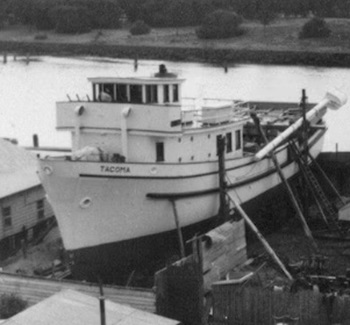 fishing industry. “I remember the boat going into its first big waves — we quickly ran down into the galley and watched the waves from there,” Ross said. Ross and one of the original crew members, 90-year-old Jack Bellamy, made the return trip this year aboard the Tacoma from Port Lincoln to Port Fairy, where it arrived on March 25. Photos, Video, more, >>CLICK TO READ<< 06:30
fishing industry. “I remember the boat going into its first big waves — we quickly ran down into the galley and watched the waves from there,” Ross said. Ross and one of the original crew members, 90-year-old Jack Bellamy, made the return trip this year aboard the Tacoma from Port Lincoln to Port Fairy, where it arrived on March 25. Photos, Video, more, >>CLICK TO READ<< 06:30
Large southern rock lobsters from Beachport fetch up to $500 each as SA fisher celebrates catch
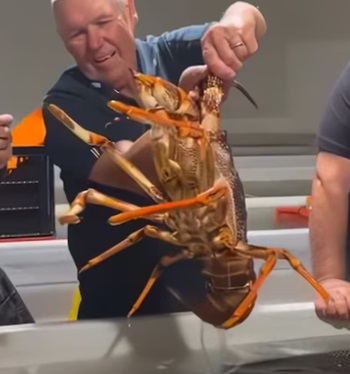 In the past, giant lobsters sold for less than their smaller counterparts because their taste was considered inferior — but that has changed. South Australian fisher Craig “Slim” Reilly recently caught rock lobsters that fetched up to $500 each, including one that weighed close to five kilograms. The three-decade industry veteran said they did not come much bigger than that. “One of the biggest [I’ve caught] for sure,” Mr Reilly said. The cray, caught in January in shallow water near Beachport, weighed 4.85kg. Mr Reilly guessed it was at least 30 years old. He said bigger lobsters used to sell for less per kilogram than their smaller counterparts, but that was no longer the case. Video, more, >>click to read<< 07:51
In the past, giant lobsters sold for less than their smaller counterparts because their taste was considered inferior — but that has changed. South Australian fisher Craig “Slim” Reilly recently caught rock lobsters that fetched up to $500 each, including one that weighed close to five kilograms. The three-decade industry veteran said they did not come much bigger than that. “One of the biggest [I’ve caught] for sure,” Mr Reilly said. The cray, caught in January in shallow water near Beachport, weighed 4.85kg. Mr Reilly guessed it was at least 30 years old. He said bigger lobsters used to sell for less per kilogram than their smaller counterparts, but that was no longer the case. Video, more, >>click to read<< 07:51
MH370 10 years on: Should the search for the doomed flight continue?
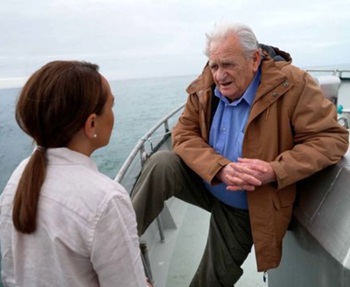 Pressure is mounting on the Australian government to launch a new search for missing plane MH370, as the families of those on board the Boeing 777 prepare to mark 10 years since the doomed flight took off from Kuala Lumpur. 239 passengers and crew were on board the aircraft bound for Beijing when it vanished somewhere in the Indian Ocean on March 8, 2014. Waring believes the authorities should investigate the reported discovery of a large wing of an aircraft reportedly found off the coast of South Australia. Kit Olver told 60 Minutes he immediately thought of MH370 when the piece of debris got caught in the net of his fishing trawler seven months after the flight disappeared. Photos, more, >>click to read<< 09:54
Pressure is mounting on the Australian government to launch a new search for missing plane MH370, as the families of those on board the Boeing 777 prepare to mark 10 years since the doomed flight took off from Kuala Lumpur. 239 passengers and crew were on board the aircraft bound for Beijing when it vanished somewhere in the Indian Ocean on March 8, 2014. Waring believes the authorities should investigate the reported discovery of a large wing of an aircraft reportedly found off the coast of South Australia. Kit Olver told 60 Minutes he immediately thought of MH370 when the piece of debris got caught in the net of his fishing trawler seven months after the flight disappeared. Photos, more, >>click to read<< 09:54Commercial and recreational fishers call for overhaul of SA and Queensland permit system
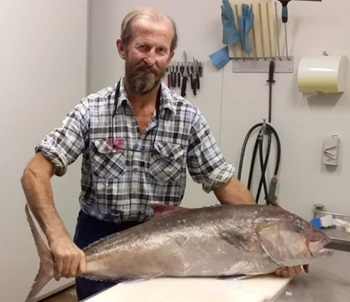 Some commercial fishers in South Australia are calling for an overhaul of the recreational fishing sector, including the introduction of a permit system and a phone app for reporting their catch. SA and Queensland are the only states where recreational anglers are not required to hold permits. Elsewhere they need permits to fish from boats and in some jurisdictions, licences are required to fish from land.But commercial operators from the Marine Scalefish Fishery in SA are required to pay an annual base fee of $3,000 and those who hold quota licences pay thousands on top of that. Lower Eyre Peninsula commercial fisher Hugh Bayly would like that to change. “It’s grossly unfair,” he said. “We are paying huge amounts of money to manage a resource which everyone has a right to access and the recreational sector pays nothing.” photos, more, >>click to read<< 18:12
Some commercial fishers in South Australia are calling for an overhaul of the recreational fishing sector, including the introduction of a permit system and a phone app for reporting their catch. SA and Queensland are the only states where recreational anglers are not required to hold permits. Elsewhere they need permits to fish from boats and in some jurisdictions, licences are required to fish from land.But commercial operators from the Marine Scalefish Fishery in SA are required to pay an annual base fee of $3,000 and those who hold quota licences pay thousands on top of that. Lower Eyre Peninsula commercial fisher Hugh Bayly would like that to change. “It’s grossly unfair,” he said. “We are paying huge amounts of money to manage a resource which everyone has a right to access and the recreational sector pays nothing.” photos, more, >>click to read<< 18:12
A trawler skipper’s memory from the deep dredges up intriguing questions
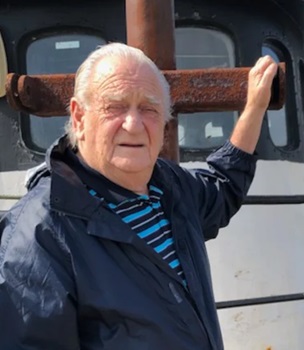 Kit Olver felt his trawling net had snagged something large and unwelcome way in the depths long before he had any physical evidence of it. The note of his deep-sea trawler’s diesel engine deepened, and its exhaust gas temperature rose as it sought the torque to haul against the sudden load. What Olver’s net eventually brought to the surface off South Australia’s south-east coast that day, nine years ago, has bothered him ever since. He hasn’t spoken about it for years. Now, aged 77, with his seagoing years behind him and a couple of heart attacks reminding him that everything, even the chance to unload old secrets, has an expiry date, he wants to air his story. “It was a bloody great wing of a big jet airliner,” he says. He takes a breath, as if confronted by the memory. more, photos, >>click to listen/read<< 06:23
Kit Olver felt his trawling net had snagged something large and unwelcome way in the depths long before he had any physical evidence of it. The note of his deep-sea trawler’s diesel engine deepened, and its exhaust gas temperature rose as it sought the torque to haul against the sudden load. What Olver’s net eventually brought to the surface off South Australia’s south-east coast that day, nine years ago, has bothered him ever since. He hasn’t spoken about it for years. Now, aged 77, with his seagoing years behind him and a couple of heart attacks reminding him that everything, even the chance to unload old secrets, has an expiry date, he wants to air his story. “It was a bloody great wing of a big jet airliner,” he says. He takes a breath, as if confronted by the memory. more, photos, >>click to listen/read<< 06:23
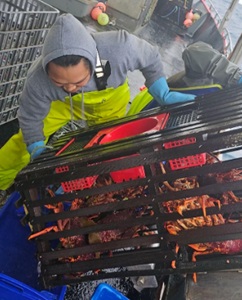
Changing to batten lobster pots found to improve catch efficiency, meaning less days at sea
South Australia’s southern rock lobster fishers have not been using the best pots, according to the results of a five-year study testing different designs, with the West Australian batten pot coming out on top. When directly compared to the beehive pot, which is legislated for use in South Australia, batten pots improved catch efficiency rates by 38 per cent. Some fishers in SA’s northern zone have already decided to switch to batten pots. Emily Rowe is the shore manager for a lobster fishing 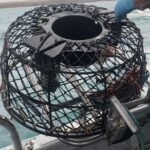 business based in Port Lincoln who took part in the trial and then decided to make the permanent switch to batten pots this year. South Australian Northern Zone Rock Lobster Association executive officer Kyri Toumazos said it would not be long before most professional fishers made the switch. Photos>>click to read<< 13:54
business based in Port Lincoln who took part in the trial and then decided to make the permanent switch to batten pots this year. South Australian Northern Zone Rock Lobster Association executive officer Kyri Toumazos said it would not be long before most professional fishers made the switch. Photos>>click to read<< 13:54
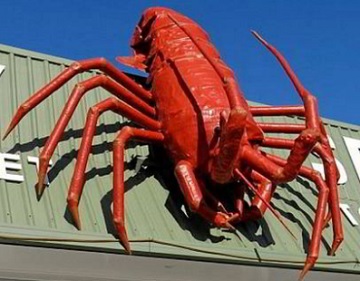
Lobster row rocks offshore wind as state tells turbines to stay away
The government of South Australia is unimpressed by a federal decision to include the state’s waters among a list of six areas chosen for pioneering offshore wind tenders, citing risks to its valuable fisheries industry and sparking a row with trade unions which support the renewable source. A period of consultation for the Southern Ocean Wind Zone was opened by Australia’s energy minister Chris Bowen in July, as part of a federal government plan to have six areas fully defined and declared by mid-2024. As part of this process, the South Australian government has come out in opposition, and said the proposed zone should simply stop at the border with Victoria, pointing out that the proposed wind farms will be connected to that state’s grid. >>click to read<< 13:42
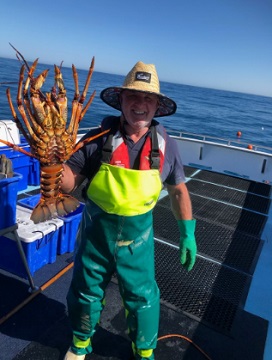
Fisherman David Dunsford reflects on 50 years at sea amid luck, loss and laughter
Saltwater runs through David Dunsford’s veins. “Our story is a pretty special story really; my mother’s family came out from Sicily by ship, landed in Albany and made their way to south-eastern South Australia,” he says. “My grandfather, Frank Corigliano, was one of 14 children; the product of an Italian father and an Irish mother – so a huge fishing family, and I was lucky they stayed here in Beachport.” David says his ancestors were pioneers of the southern rock lobster industry, which today contributes more than 30 per cent – or $158.5 million — to South Australia’s seafood gross state product and employs about 1,300 people through direct and flow-on business. David recalls the moment the die on his own fishing destiny was cast. “I remember being at school one day, about 15, and my father said to me, ‘David, it might be best if you come home’. Photos, >>lick to read<< 07:53
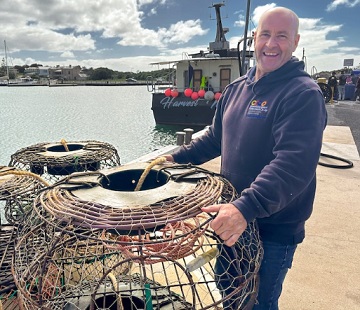
Lobster season underway, but South Australian fishers still missing out on Chinese trade
Lobster fishers in South Australia’s southern zone are heading out today to set their pots for the start of the season. After a two-year trial, the season’s September 1 start date has become permanent in the hope it will help get lobsters onto the plates of those celebrating the Chinese Mid-Autumn Festival. Robe lobster fisher Paul Regnier supports the change. “It has been a real bonus for us,” he said. But China is still not allowing Mr Regnier’s catch into the country — officially, at least. China’s 2020 ban on Australian lobsters sent prices crashing and exporters were forced to find new markets for the crustaceans. >>click to read<< 10:34
South Australia rejects proposed Southern Ocean offshore wind energy zone over lobster industry concern
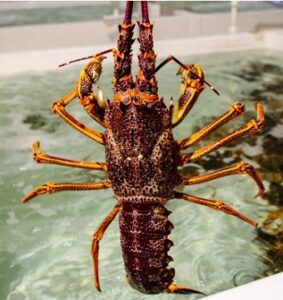 One state is bucking a push for more wind farms in Australia due to fears the gigantic renewable energy generators could damage vulnerable ocean wildlife and put hundreds of fishermen out of work. South Australia has officially notified the federal government it does not support a proposed Southern Ocean offshore wind farm zone stretching from Warrnambool in Victoria to Port MacDonnell in the state’s southeast Limestone Coast region. Primary Industries Minister Clare Scriven said the construction of massive turbines could damage the state’s $187.5m rock lobster industry, which generates more than 1000 full time jobs in the area. >>click to read<< 11:17
One state is bucking a push for more wind farms in Australia due to fears the gigantic renewable energy generators could damage vulnerable ocean wildlife and put hundreds of fishermen out of work. South Australia has officially notified the federal government it does not support a proposed Southern Ocean offshore wind farm zone stretching from Warrnambool in Victoria to Port MacDonnell in the state’s southeast Limestone Coast region. Primary Industries Minister Clare Scriven said the construction of massive turbines could damage the state’s $187.5m rock lobster industry, which generates more than 1000 full time jobs in the area. >>click to read<< 11:17
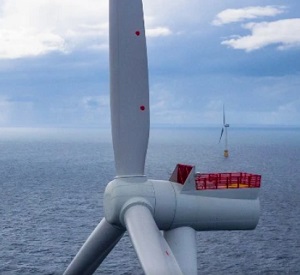
Blue Float Energy’s offshore wind farm opposed by Port Macdonnell community due to fishing, tourism concerns
A small coastal community in regional South Australia is ramping up its opposition to a proposed offshore wind farm off the state’s south-east coast. Renewable energy company Blue Float Energy has lodged plans for a 77-turbine wind farm off the coast of Port Macdonnell which would generate 1.1 gigawatts of clean energy. The proposal has already met resistance from Port Macdonnell residents where the local economy relies on commercial fishing and seaside tourism. Local fishers say the 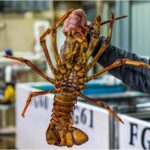 proposed area for the wind turbines, 8-20 kilometres offshore, is where many catch their lobster, with fears any exclusion zone placed around the turbines would make areas inaccessible. They are also concerned about any environmental impacts on lobster, despite no studies yet taking place. >click to read< 10:12
proposed area for the wind turbines, 8-20 kilometres offshore, is where many catch their lobster, with fears any exclusion zone placed around the turbines would make areas inaccessible. They are also concerned about any environmental impacts on lobster, despite no studies yet taking place. >click to read< 10:12
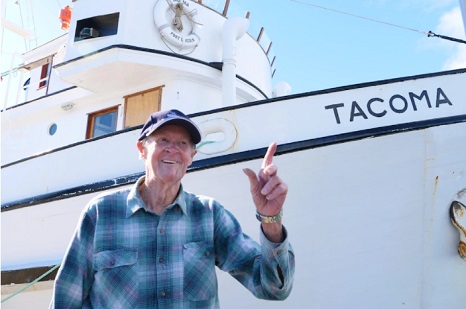
Jack Bellamy, South Australia’s traditional tuna fisher pioneer poles his last fish at 88
Jack Bellamy says he’s poled his last southern bluefin tuna. The 88-year-old is a pioneer of the commercial tuna fishing industry in South Australia and is the last of his era to land a tuna by pole. Mr Bellamy came to South Australia with his twin, Keith, 70 years ago from Port Fairy in Victoria, aboard the purpose-built purse seine net boat, Motor Fishing Vessel (MFV) Tacoma. The Haldane family built the wooden boat over seven years. When it was ready to launch, the neighbouring Bellamy twins, who’d grown up watching it take shape outside their kitchen window, joined the crew. They turned 18 on the way to Port Lincoln. Video, photos, >click to read< 07:55
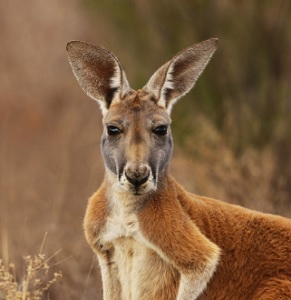
Commercial fishing reforms come into play across South Australia
South Australia’s much-anticipated $24.5 million reform of the marine scalefish fishery officially went into effect on July 1. The state government says changes will strengthen the long-term financial and ecological sustainability of the commercial fishing industry. Changes include a trading system where fishers can exchange and bid for quotas to catch certain species, as well as new zones and other regulatory changes. The changes have not come without some disruption, as the government bought out licence holders. For example, as many as half of Kangaroo Island’s commercial marine scale fishermen decided to surrender their licences. Late last year, applications for nearly 130 commercial fishing licence surrenders had been received in the state government’s reform of the marine scalefish fishery. >click to read< 07:44
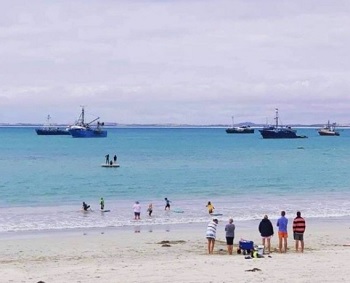
Commercial southern bluefin tuna fleet battles turbulent La Niña weather and global market
More than 40 vessels and six spotter planes are involved in the search for large schools of bluefin tuna off the picturesque tourist town of Robe. About 10,000 fish at a time will be captured and towed in cages to farms at Port Lincoln — the home of the state’s tuna industry — to be grown out for key markets in Japan and China. Australian Southern Bluefin Tuna Industry Association chief executive Brian Jeffriess said the La Niña weather event was causing problems for the sector. He said the cooler weather conditions were fuelling “unpredictable” fishing trends and lower catch rates. >click to read< 13:50
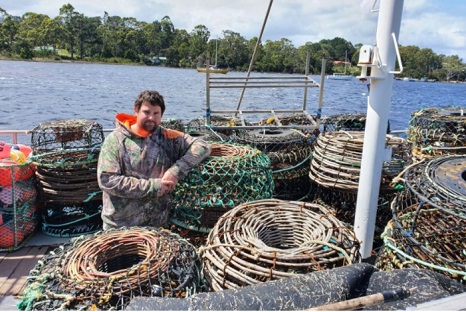
Australia: Cheap lobsters on Christmas tables as prices plummet due to China import ban
Commercial fishers operating in Victoria, Tasmania, and South Australia are supplying record volumes to the domestic market after China’s ban on Australian live lobster imports. With the crustaceans removed from restaurants and markets in China, (you know the drill),,,Tasmanian commercial fisher Jason Hart this week sold his catch directly to the public at the Strahan wharf. “I’ve never had to worry about selling them from the wharf before,” Mr Hart said. “Even when our markets have been bad you can still on-sell the fish. But I’ve never seen it like this,,, >click to read< 13:48
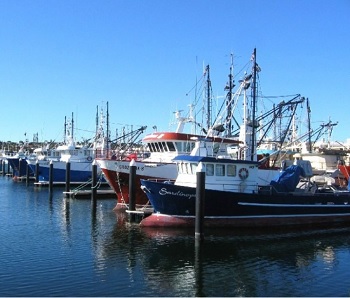
South Australian reforms (catch shares) to put two-thirds of local commercial fishers out of business
A petition to address “loopholes” in the South Australian Government’s Marine Scalefish Fishery reforms has been launched by stakeholders who believe the changes will render the majority of local commercial fishers unviable. With just four days until the Government’s licence buyback scheme finishes, the Marine Fishers Association (MFA) has warned licences are at risk of being bought up by corporate traders,, “Unless loopholes are addressed, over two-thirds of our local commercial fishers will be unable to remain in business and South Australia risks losing its local fishing industry forever,” the MFA said. “This has already happened in other industry species; offshore and interstate investors already control over 65 percent of our rock lobster industry.” >click to read< 13:40
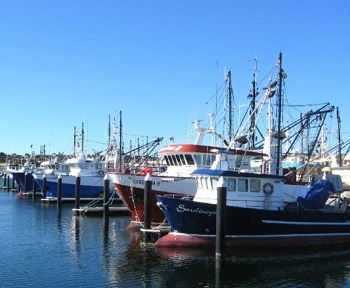
South Australia West Coast fishers reeling from priority species quota ITQ
Fishers on South Australia’s West Coast fishers who have invested hundreds of thousands in boats and licences since 2016 say they have received new quotas that only allow them to catch 87 kilograms of priority species annually. The State Government is rolling out what it calls individual transferable quotas (ITQs), part of its controversial Marine Scalefish Fishery,, for those with a catch history prior to 2016, particularly West Coast fishers where the average age was between 55 and 60, the formula was effectively a “golden handshake” to sell their quota and exit the industry. But he said it was anything but for younger fishers who bought into the industry after mid-2016,, Mr Schmucker said the industry would be “divided” as young operators scrambled to find another $150,000 to buy more quota while simultaneously competing with investors who were snapping up relinquished ITQs. >click to read< 09:10
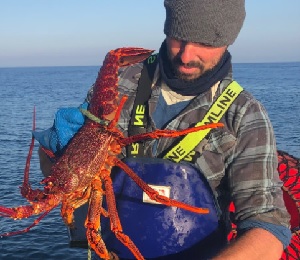
‘Lobsters overboard’ as China bans live seafood trade over coronavirus fears
Australia’s seafood industry has been thrown into crisis by the ban, with local fishermen considering a plan to return thousands of lobsters to the open waters. The export industry has ground to a halt in Victoria, Western Australia, South Australia and Tasmania as China usually imports about 90 to 95 per cent of locally-grown lobsters. >click to read< 16:47
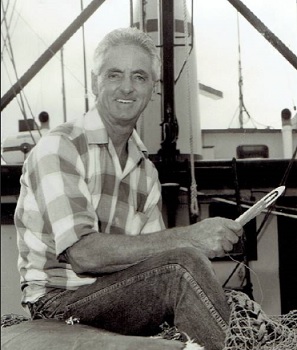
Port Lincoln prawn pioneer’s discovery recorded
As a new season dawns for the Spencer Gulf King Prawn Fishery, the story of the man who found the first commercial quantity of prawns in the Spencer Gulf. Roger ‘Doc’ Howlett’s story of the founding of the fishery has been recorded which details how he found the first commercial quantity of prawns at an area known as the ‘Gutter’ in 1967. Mr Howlett died in February last year but before his death approached prawn fishery coordinator at sea Greg Palmer with his story. Photo’s >click to read< 16:04
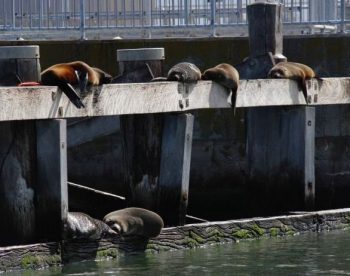
Managing Coorong seals could provide local jobs, say Indigenous elders
The number of seals in the region has increased dramatically in the past five years, and many fishermen have called for a cull. But Indigenous elders in the Lower Lakes and Coorong region said there could be other ways to manage the seals.,,, A recent senate inquiry recommended culling overabundant species, such as corellas and kangaroos, when the pests’ impact on the community warrants it. But South Australian Environment Minister David Spiers said in the case of the Coorong seals, more research was needed before the State Government would consider a cull. >click to read< 16:24
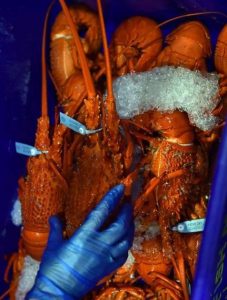
‘Barely a scallop’: fears oil and gas exploration will destroy fishery
There are calls for a moratorium on seismic surveys by the oil and gas industry from members of the fishing industry after new Australian research shows it has serious impacts on invertebrates such as lobster, scallop, abalone and crab. The calls come as three different oil and gas companies have told industry bodies they want to carry out seismic explorations in Otway basin this summer. Tasmanian Seafood Industry Council (TSIC) chief executive, Julian Harrington, says: “This is a big issue for our industry and we now have research that backs our concerns.” >click to read<20:19
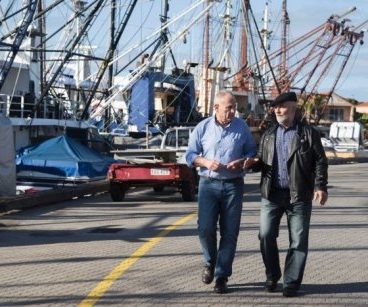
Oil drilling bid for Great Australian Bight not a boring debate for Port Lincoln locals
Plans to drill for oil in the Great Australian Bight off the coast of South Australia have sparked a lively debate in the seaside town of Port Lincoln. In a city that calls itself the seafood capital of Australia, the discussion centres on the future of its greatest asset — The Great Australian Bight. Norwegian oil company, Equinor, plans to drill for oil in the seas that support Port Lincoln’s most important industry.,, Norwegian Fisherman’s Association representative, Bjornar Nicolaisen, also addressed the meeting, on behalf of an ongoing campaign in Norway to protect fisheries from drilling. Overwhelmingly speakers spoke against Equinor’s plans — just three people on the evening put forward cases for the plans. >click to read<09:57
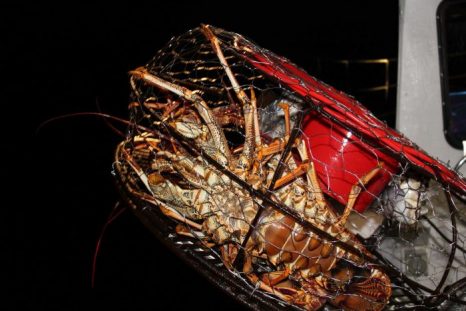
Life on a rock lobster boat
Starting in the dark, long days in isolation, and repetitive physical labour. Sounds like farming, but it’s actually the life of a rock lobster fisherman. It is 3:15am, cold and dark, and Colin and Brodi Milstead are headed into the Southern Ocean. The father-and-son team are aboard Brodi Milstead’s boat, Impact, at the Robe marina in South Australia. It is a simple vessel, 53-feet long. Off the side hangs a pulley style machinewhich will be used to lift out the pots of red gold — the treasure being southern zone rock lobsters. click here to read the story 11:38
South Australian fishing community calls for seal cull
Fisherman Glen Hill says he’s been battling against an increasing number of  for almost a decade, and he’s had enough. “The seals don’t belong here. They’ve got to go. They have to go,” he told SBS. The co-owner of Coorong Wild Seafood said he first noticed long-nosed fur seals in his patch at Lake Albert, near the mouth of the Murray River, about eight years ago. “It’s just becoming bigger and bigger and bigger,” he said. “Fifty seals will follow you around of a night. One seal can pull out anywhere from 100 to 200 kilos of fish. Read the rest here 11:58
for almost a decade, and he’s had enough. “The seals don’t belong here. They’ve got to go. They have to go,” he told SBS. The co-owner of Coorong Wild Seafood said he first noticed long-nosed fur seals in his patch at Lake Albert, near the mouth of the Murray River, about eight years ago. “It’s just becoming bigger and bigger and bigger,” he said. “Fifty seals will follow you around of a night. One seal can pull out anywhere from 100 to 200 kilos of fish. Read the rest here 11:58
South Australia Wants to Solve Their Seal Problem with Underwater Bombs
 The long-nosed fur seal population in South Australia’s Coorong region has been getting out of hand for a while now. The state population now tops 100,000, and the South Australian government is considering using explosives to scare them away from commercial fishing areas. Unsurprisingly, animal rights groups aren’t happy about it. Calling the seals “rats of the sea,” Liberal MP Adrian Pederick originally proposed a culling program. So Minister Hunter is looking into alternative solutions, one of which being seal-deterring explosives. Known as ,,, Read the rest here 09:38
The long-nosed fur seal population in South Australia’s Coorong region has been getting out of hand for a while now. The state population now tops 100,000, and the South Australian government is considering using explosives to scare them away from commercial fishing areas. Unsurprisingly, animal rights groups aren’t happy about it. Calling the seals “rats of the sea,” Liberal MP Adrian Pederick originally proposed a culling program. So Minister Hunter is looking into alternative solutions, one of which being seal-deterring explosives. Known as ,,, Read the rest here 09:38
A new commercial fishery for deep water crabs is being considered in South Australia
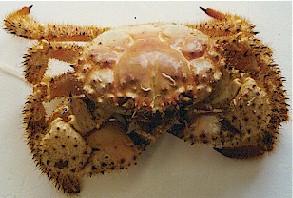 “The Government occasionally receives applications seeking permission to investigate the viability of new commercial fishing activities, including harvesting species not currently fished commercially,” Mr Sloan said. He said the current application proposed to harvest deep water crabs from waters deeper than 300 metres off the South Australian coast. Fishing for crabs at these depths is expected to target Crystal, Snow and Champagne crabs which are sought after by the major export markets of China and Singapore, he said. Read the rest here 09:53
“The Government occasionally receives applications seeking permission to investigate the viability of new commercial fishing activities, including harvesting species not currently fished commercially,” Mr Sloan said. He said the current application proposed to harvest deep water crabs from waters deeper than 300 metres off the South Australian coast. Fishing for crabs at these depths is expected to target Crystal, Snow and Champagne crabs which are sought after by the major export markets of China and Singapore, he said. Read the rest here 09:53






